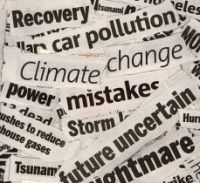

Being the first major developed economy to do so, the UK is looking to toughen its targets on greenhouse gases over the next 15 years.
The government's climate advisors recommend that emissions of carbon dioxide in the UK must be cut by 78% by 2035 compared to 1990 levels to be able to realistically achieve net-zero by 2050. The Prime Minister is expected to announce tougher measures later this week. Currently, the carbon-cutting goal for 2035 is set in the Climate Change Act 2008 to be 68%.
It is intended to help spur on further action from other governments before vital UN talks take place - COP26 is to be held by the UK in Glasgow this November.
At COP26, the nations will be asked to set out their plans for carbon curbs over the next 10 years. They are known as nationally determined contributions, and they form the bedrock of the Paris Agreement. Sadly, current plans from most countries look to be far too weak to fulfil the aims of the treaty.
The United States' nationally determined contributions (NDC) are due to be set out later this week by Joe Biden, ahead of a virtual summit he is hosting with 40 world leaders. NDCs from other countries are due to be submitted close to this time - China, Japan, South Korea and Canada are imminent.
Though the UK already had an NDC in place, by setting out a further goal by 2035, the Prime Minister will fulfil the legal obligations that were set out in the Climate Change Act 2008 - here they are expected to set five-year carbon budgets that stretch beyond the current term of parliament. The UK's sixth carbon budget was introduced last December, by the Committee on Climate Change, and will run to 2035.
The Department for Business, Energy and Industrial Strategy refused to confirm the plans, with a spokesperson stating that, "We will set our ambition for Carbon Budget 6 shortly, taking into account the latest advice from the Climate Change Committee."
Labour accused the government of setting targets without putting in place the policies to deliver them. The Shadow Business Secretary, Ed Miliband, said that “The character of this government on climate change is now clear: targets without delivery. So while any strengthening of our targets is the right thing to do, the government can’t be trusted to match rhetoric with reality. Ministers have failed to bring forward an ambitious green recovery. We need a government that treats the climate emergency as the emergency it is.”
The government has caused some consternation over the past couple of months, with a series of measures that appear to be at odds with their plans and commitment to tackling climate change. One of these issues causing a lot of worries was the decision to slash overseas aid.
Another concern is towards the new coal mine that has just been approved, that is now subject to public inquiry, as well as new licences for oil and gas explorations in the North Sea; the UK's support for making a climate sceptic former minister the head of the OECD, the scrapping of the green homes grant, and slashing of support for electric vehicles.
Chris Venables of the Green Alliance Thinktank has stated that “It’s great news that the government will put the 2035 target into law, and including aviation and shipping is genuine global climate leadership. But it’s increasingly jarring for this long-term ambition not be backed up by action in the here and now. The clock is running down to Cop26 in November, and a detailed and fully funded net-zero plan is needed well before then.”
The campaigns director for the climate change Thinktank E3G, Ed Matthew, said, “Setting an ambitious emission reduction target would boost the UK’s diplomatic drive to persuade other countries to set out ambitious targets of their own. That is one of the big tests of UK climate diplomacy ahead of the COP26 climate summit. The UK now has the opportunity to spark a global green industrial revolution but ultimately its credibility will rest on action. It must now put in place the policies and investment needed to achieve the target. That is the mark of true climate leadership.”